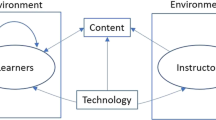Abstract
In line with the smart learning environment, online learners require not only adequate supports to help them overcome loneliness and demotivation, but they also need pertinent guidance and orientation for proper interactions in line with their learning experience. In a socio-constructivism approach, this study examines unsupervised synchronous learner-learner interactions that took place in an online campus of a French university. At a master’s level, three teams of French speaking learners, with different cultural background, were given the same problem based assignment to complete. With the aim of understanding how interactions took place in this educational setup, content analysis was used, based on the Activity Theory of Engeström, on a total of 25 online meetings, organized by three teams, totaling to 3585 number of lines of logged textual interactions. Interestingly, it was found that the teams successfully completely their tasks by exchanging on almost the same types of interactions. However, the quality of these interactions can still be enhanced to generate higher cognitive and metacognitive discussions, as per the expectations of the tutors. Suggestion is given for recommender systems to be integrated in smart learning environment.
Access this chapter
Tax calculation will be finalised at checkout
Purchases are for personal use only
Similar content being viewed by others
References
Gros, B.: The design of smart educational environments. Smart Learn. Environ. 3, Article no. 15 (2016). https://slejournal.springeropen.com/articles/10.1186/s40561-016-0039-x
Ireri, B., Wario, R.: An assessment of predictors of learner’s attention and their influence to learner’s engagement and learning outcomes in a mobile learning classroom. In: 2017 IST-Africa Week Conferences, IEEE Proceedings (2017)
Panchoo, S.: Interagir pour collaborer et apprendre à distance avec les Technologies de l’Information et de la Communication: Approche méthodologique d’étude des interactions d’une formation à distance, thesis. University of Cergy-Pontoise, Paris (2010)
Panchoo, S.: Quels soutiens recherchent les apprenants lors d’un tutorat en ligne?. Colloque scientifique international sur les TIC en éducation: bilan, enjeux actuels et perspectives futures, Montréal, Canada (2012)
Assami, S., et al.: Ontology-based modeling for a personalized MOOC recommender system. In: Rocha, Á., Serrhini, M. (eds.) EMENA-ISTL 2018, SIST, vol. 111, pp. 21–28. Springer, Switzerland (2019). https://doi.org/10.1007/978-3-030-03577-8_3
Gavrilovic, N., Jovanovic, S., Mishra, A.: Personalized learning system on student behaviour and learning style. In: The 8th International Conference on eLearning (eLearning-2017), Belgrade, Serbia, September 2017
Audet, L.: Recherche sur les facteurs qui influencent la persévérance et la réussite scolaire en formation à distance, Réseau s’enseignement francophone à distance au canada-REFAD (2008)
Nault, G., Marceau, F.: Récit d’une mise à l’essai concernant l’encadrement en ligne, CLIC-Bulletin collégial des technologies de l’information et des communications, numéro 65, Octobre 2007. http://clic.ntic.org/cgi-bin/aff.pl?page=article&id=2057. consulté le 17 juillet 2009
Gilkman, V.: Des cours par correspondance au «e-learning». Education et formation PUF (Presses universitaires de France) (2002)
Peraya, D.: De la correspondance au campus virtuel: formation à distance et dispositifs médiatiques. In: Technologie et Innovation en pédagogie, Dispositifs innovants de formation pour l’enseignement supérieur, De Boeck (2001)
Engeström, Y.: Expansive Learning at work: towards an activity theoretical reconceptualisation. J. Educ. Work 14(1), 133–156 (2001)
Engeström, Y.: Learning by Expanding. Orienta-Konsultit, Helsinki (1987)
Engeström, Y.: Learning, Working, and Imagining: Twelve Studies in Activity Theory. Orienta-Konsultit Oy, Helsinki (1990)
Uden, L., Kumaresan, A., Salmenjoki, K.: Usable collaborative email requirements using activity theory. Informatica 31 (2007). http://ai.ijs.si/informatica/PDF/31-1/18_Uden-Usable%20Collaborated…pdf
Nezamirad, K., Higgins, P., Simon, D.: Cognitive analysis of collaboration as an activity. In: ACM International Conference Proceeding Series. Archive Proceedings of the 2005 Annual Conference on European Association of Cognitive Ergonomics, vol. 132, Chania, Greece (2005)
Roussou, M., Olivier, M., Slater, M.: Exploring activity theory as a tool for evaluating interactivity and learning in virtual environments for children. Springer, London (2007)
Panchoo, S., Jaillet, A.: L’enseignement à distance modifie-t-il la façon d’apprendre?. In: Conférence ICOOL05, Cape-Town, 4–7 juillet (2005)
De Freitas Maria, R., Byrne, E.: Activity theory as an analytical tool: a case study of IS development for an anti-retroviral treatment clinic in South Africa. In: ACM International Conference Proceeding Series. Proceedings of the 2006 Annual Research Conference of the South African Institute of Computer Scientists and Information Technologists on IT Research in Developing Countries, vol. 204 (2006). Archive
Swan, K.: Examining social presence in online courses in relation to students’ perceived learning and satisfaction. J. Asynchronous Learn. 7(1), 2003. Accessed 29 Mar 2008. Author, F.: Article title. Journal 2(5), 99–110 (2016)
Moore, M.G.: Three types of interaction. Am. J. Distance Educ. 3(2) (1989)
Panchoo, S.: Identifying online learners’ requirements for an efficient feedback and support system. In: IEEE Proceedings of the 2015 International Conference on Science in Information Technology (ICSITech), Yogyakarta, Indonesia, 27–28 October 2015
Author information
Authors and Affiliations
Corresponding author
Editor information
Editors and Affiliations
Rights and permissions
Copyright information
© 2020 Springer Nature Switzerland AG
About this paper
Cite this paper
Panchoo, S., Jaillet, A. (2020). Content Analysis and Learning Analytics on Interactions of Unsupervised Learners in an Online Learning Environment. In: Serrhini, M., Silva, C., Aljahdali, S. (eds) Innovation in Information Systems and Technologies to Support Learning Research. EMENA-ISTL 2019. Learning and Analytics in Intelligent Systems, vol 7. Springer, Cham. https://doi.org/10.1007/978-3-030-36778-7_6
Download citation
DOI: https://doi.org/10.1007/978-3-030-36778-7_6
Published:
Publisher Name: Springer, Cham
Print ISBN: 978-3-030-36777-0
Online ISBN: 978-3-030-36778-7
eBook Packages: Intelligent Technologies and RoboticsIntelligent Technologies and Robotics (R0)




